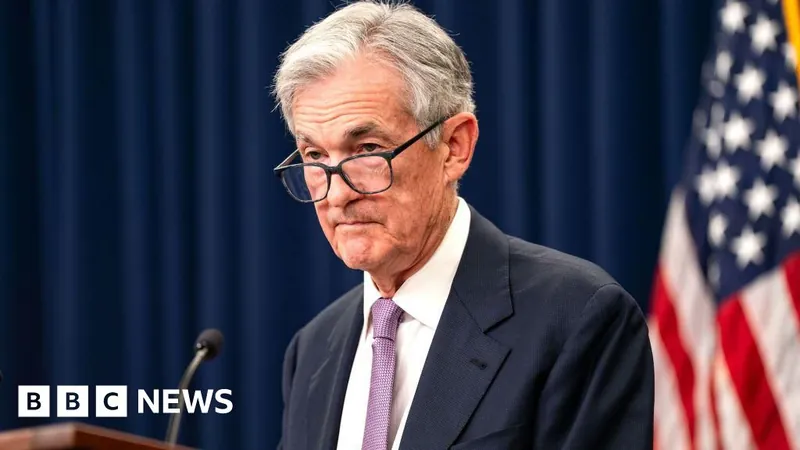
Jerome Powell Stands Firm: Trump Cannot Fire Him Amid Economic Uncertainty
2024-11-08
Author: Jia
Introduction
In a bold statement, Federal Reserve Chairman Jerome Powell has assured that his position is secure and cannot be influenced by the incoming Trump administration. During a recent press conference, Powell addressed speculation surrounding his potential dismissal by Donald Trump, who is set to assume power in Washington. He clarified, "I am not stepping down if asked, as it is not permitted under law for the White House to remove me."
Federal Reserve's Rate Decision
This declaration comes on the heels of the Federal Reserve's decision to lower borrowing costs, adjusting the key lending rate to a range between 4.5% to 4.75%. Economists had anticipated this move amid fears of rising inflation driven by Trump's proposed policies, which include sweeping tax cuts and potential tariffs on imports.
Implications of Trump's Policies
Trump's commitment to impose at least 10% import duties on all foreign goods raises eyebrows among economists, who warn that these costs will ultimately be passed onto consumers, further stoking inflation. Additionally, significant tax cuts could lead to increased consumer spending, exacerbating inflationary pressures, while Trump's controversial plan for mass deportations could eliminate a substantial portion of the U.S. workforce, potentially driving wages up as companies scramble to fill roles.
Economic Concerns
The recent uptick in U.S. debt interest rates reflects these underlying concerns. In light of this, Powell stated it is still premature to predict how the new administration's agenda will influence the U.S. economy or to determine how the Federal Reserve should adapt. "We are in the early stages; we lack clarity on the policies and their implementation timelines," he noted, adding, "Therefore, the election results will not influence our immediate policy decisions."
Powell's Stance Amid Criticism
Despite being appointed by Trump in 2017, Powell has found himself the target of the former president's criticism over the years. In past statements, Trump referred to Fed officials as “boneheads” and explored options to replace Powell. Nonetheless, he expressed that he would allow Powell to complete his term if he believed the Chairman was making the right decisions. Powell, however, has maintained that he would resist any undue pressure from the White House.
Monetary Policy Adjustments
The Fed recently adjusted its monetary policy, significantly reducing rates starting in September by an unprecedented 0.5 percentage points, asserting confidence that inflation rates were stabilizing. Official reports indicated that inflation fell to 2.4% by September, down from a staggering 9% in June 2022. The recent cut announced by Powell marks the second decrease in succession—with a more modest 0.25 percentage point reduction.
Job Market and Future Expectations
Despite concerns about job losses earlier this year, positive hiring data in September restored some confidence; however, job growth stagnated in October, relating to significant nationwide disruptions from hurricanes and strikes. Powell affirmed the Fed's commitment to maintaining both price stability and a healthy labor market while hinting at the possibility of continued rate cuts. Yet, he avoided committing to specific timelines, stating, "The uncertainty makes it impractical to offer detailed guidance. Our goal is to determine the best pace for adjustments as we move forward."
Market Forecasts and Global Impact
Market analysts, such as Whitney Watson from Goldman Sachs Asset Management, forecast that another rate cut could be on the horizon, potentially in December. However, they caution that stronger economic data combined with uncertainties surrounding fiscal and trade policies may lead the Fed to adopt a more conservative approach in the coming year.
Bank of England's Position
This decision was echoed by the Bank of England, which also hinted at prolonged high borrowing costs due to inflation. As the global financial landscape shifts, experts like Lindsay James from Quilter Investors remark that expectations for rate reductions have waned, suggesting that both U.S. and U.K. central banks must tread carefully as they navigate the effects of Trump’s proposed economic policies.
Conclusion
As the dust settles on the election outcome, the financial world watches anxiously, with Powell's steadfastness promising to shape the Fed's path amidst the evolving economic landscape.





 Brasil (PT)
Brasil (PT)
 Canada (EN)
Canada (EN)
 Chile (ES)
Chile (ES)
 España (ES)
España (ES)
 France (FR)
France (FR)
 Hong Kong (EN)
Hong Kong (EN)
 Italia (IT)
Italia (IT)
 日本 (JA)
日本 (JA)
 Magyarország (HU)
Magyarország (HU)
 Norge (NO)
Norge (NO)
 Polska (PL)
Polska (PL)
 Schweiz (DE)
Schweiz (DE)
 Singapore (EN)
Singapore (EN)
 Sverige (SV)
Sverige (SV)
 Suomi (FI)
Suomi (FI)
 Türkiye (TR)
Türkiye (TR)